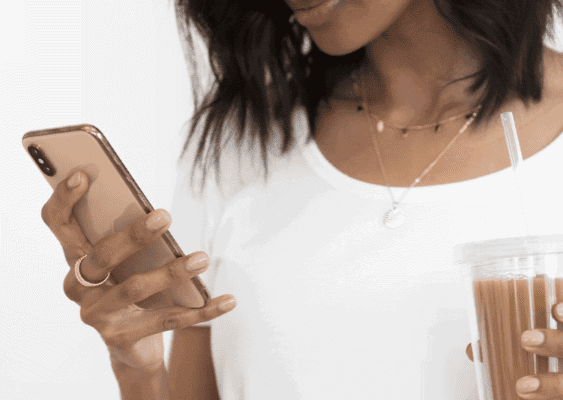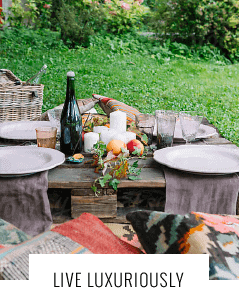Consciousness Around What We Consume - Or Don't
Practicing self-care means setting boundaries and being honest with ourselves regarding what we consume.
We are often our harshest critics, but we're also the ones who know best what we need.
Whether it's too much of a good thing or too much of a bad one, mindfulness, awareness, self-control, and consciousness around what we consume are all practices that can change the way we live and experience our lives.
Here are several areas where you can be conscious about what you allow into your world. By doing so, you'll preserve your peace, elevate your self-image, and create a life that is healthy, balanced, elegant, and sound.
Social Media Mindfulness
You can have an extraordinary life - but you won't find it online.
Social media is full of emotional content that leaves plenty of room for constant comparisons.
What's more, social media is with us at all times, in our pocket, our purse, or – let's be honest - in our hands. As a result, we are always just a click away from checking our social feeds, and doing so can become an unconscious become a habit, or worse, a behavioral addiction.
Social media is often used as an escape. But what is used to offer a distraction can also generate stress.
Even if you haven't quite reached a state of social media addiction, excessive and compulsive use of social media can be hard on your mental health and quality of life.
Conscious Consumption of the News
Sometimes we feel we have to know what's going on in the world. So we want to be educated and informed.
But bad news is a heavy burden to bear, and sometimes it seems as if there is seldom good news. When there is, it gets buried and lost among all the rest.
The news is also often conflicting and controversial - quickly triggering emotions that we end up internalizing and carrying throughout the rest of our day.
When we spend too much time consuming the news, we can be left feeling overwhelmed and exhausted, filled with the world's negative, emotional, and stressful energy.
Here's your first piece of good news for today: there are ways to stay up to date on affairs while still preventing yourself from becoming over-involved.
- Give yourself a designated time to view or read the news. Pick a time of day or a select few days of the week to consume the information.
- Consider deleting your news apps. Having the news on your phone means receiving updates and notifications (unless disabled), and the ability to access it in just one tap can be all too enticing.
- Make an effort to read up on good news, too. Multiple sources on the internet exist purely to report on and bring you good news.
- Finally, consider viewing the news with a friend or loved one. Having someone to talk about the information with helps you see multiple viewpoints, discuss what's going on in the world, and help you sort out and acknowledge any emotions that may arise.
Consume media in moderation. It will still be there tomorrow.
Watching Television
Like the news and social media, television is designed to pique and captivate our interest, and then never let it go. So we hear it all the time- "I'm addicted to this new T.V. show!"
Your favorite rom-com gives you a daily dose of laughter, and your favorite characters start to feel like friends. The drama, the gossip, and the cliffhangers keep you coming back for more.
Even if you claim that T.V. is just "background noise" or that you're "not really watching," that background noise can distract you from being fully immersed in what you're doing or take your attention away from important things.
Ask yourself this: what am I getting out of watching T.V.? How is it inspiring me? Is television helping me grow? Am I taking care of myself?
The Reading We Become Engrossed In
We are all accustomed to three-minute articles and captions that are short and sweet. Some platforms even limit users to a certain word count, dictating how much our followers or viewers will have to read.
True reading is intentional and takes being present in the moment.
When you practice mindfulness through reading, you provide yourself an act of self-care that can channel learning, ideas, knowledge, inspiration, and creativity. It can also provide a time for joy or relaxation.
Books, too, are about balance. Ask yourself if you need to bookmark a bit more often, select a new genre, or do a bit of literary shopping.
Music Can Be Magic
Music is powerful. It can elicit strong emotions and reactions to change or affect our mood.
Listen to the lyrics. A song may be catchy, but what exactly is it saying? You may be subconsciously ingesting messages that you don't necessarily agree with or that negatively affect you.
You can also use music to meditate or journal about your feelings, hopes, and dreams.
There is an art to consuming art.
Consuming Company
What type of people do you surround yourself with? What kind of energy from others do you consume?
Sometimes the consumption we need to be most conscious of is the negative or positive energy we receive from others.
I often stress the importance of setting boundaries. You need to set boundaries to look after yourself and balance your abilities and limits.
Boundaries ensure you are not over-exerting yourself, participating in activities that don't bring you joy or being taken advantage of.
Sometimes setting boundaries means saying no, and sometimes it means limiting the people you let into your life.
I set boundaries through my red velvet rope policy. I decide who I want to surround myself with, what type of people I want to let in.
Are you surrounded by people that challenge you, inspire you, and uplift you? Are you surrounded by people that bring you joy or spark connection?
Or, are you surrounded by people that drain you of energy, offer one-sided relationships, or take advantage of you?
People that make us anxious, stressed, or upset burden us with their energy and negative dispositions toward the world.
One of the most challenging things to face is when a loved one's energy or behavior negatively impacts us. When this happens, you have two choices.
- You communicate your boundaries and explain what you need for the relationship to continue.
- You can choose to allow them past your red velvet rope no longer.
Boundaries can be set with strangers, too. For example, political ranters, Debbie Downers, or people who complain or gossip too much may take away time and energy you do not have to give.
Our Relationship With Food and Eating
Eating healthy foods and practicing mindfulness around eating ensures that we're putting good in and getting good out.
Intuitive eating can help us form a peaceful and healthy relationship with food. When you eat intuitively, you eat well to feel good, and you respect your body.
Mindful eating is paying attention to the eating experience and eating without judgment.
Harnessing intuitive and mindful eating begins by listening to your mind, body, and mood. Our bodies allow us to move, communicate, breathe, and exist – and they need fuel to keep us up and running. So acknowledging your hunger and listening to your body's needs is vital to feeling good and functioning.
Here are a few ways to form a positive relationship with food:
- Thrive, Don't Just Survive: Pay attention to what you eat and how much you eat. Notice how certain foods make you feel. Are you dehydrated? Have you overeaten and now feel sluggish? Did you not eat enough and find yourself craving or lacking in energy? At what point do you feel satisfied? Eating is emotional- listen to your body's feelings.
- Ditch the Diet: Diets can restrict us, put us in boxes, or back us into corners. They can also consume time and energy spent on making sure you are following the rules. And a lot of the time they don't leave us satisfied. Incorporate healthy decision-making into every aspect of your life. If you make a habit of choosing good, healthy food options, you stress less and leave yourself time to change up what you eat, how much you eat, and satisfy your cravings.
- Sit Down and Enjoy A Meal: In our busy world of go, go, go, it's not uncommon to find ourselves eating on the run, scarfing a quick snack, or skipping meals altogether. How often do you take a lunch break? Is it a break, or are you eating at your desk or thinking about the project you have to get back to? Try to avoid working while you eat, and make your meal a moment for you. If you can't while working, find another time throughout the day to slow down, digest, and enjoy. Your brain and body are working hard- give yourself a moment to refuel.
- Respect: Some days you will eat more than others, and some days you are going to eat less- this is how food, exercise, and life work. Just as it's okay to take a rest day, it's okay to indulge a little bit. Life is about variety. But make sure you're not hurting your body or not taking care of it in a way that will affect your care which can affect taking care of others.
Eating healthy should make you feel happy, uplifted, and energized- not unhappy, stressed, and unsatisfied. It should make you feel good.
Alcohol Consumption
Just as you can mindfully eat, you can mindfully drink alcohol too. Mindful consumption of alcohol starts with thinking about your drinking.
Take a moment to ask yourself why you drink alcohol and how drinking makes you feel.
When do you drink? Has alcohol become a daily habit? Is it reserved for special occasions?
It has been a long-standing tradition to pair alcohol with pastimes, so much so that we often drink without second-guessing the act.
It has also become quite common for people to incorporate alcohol into their self-care routines too.
If you pair wine with your nightly wind-down, ask yourself how this is a form of self-care. What about it makes it so? How is it serving you? Are the next-day effects conducive to self-care, too?
Perhaps relaxation or a sense of calm is what you seek. Are there other ways that you can unwind? A cup of tea, some soothing tunes, a bubble bath, or candlelight?
Because of its ability to affect our inhibitions, alcohol consumption is much harder to regulate than most other forms of self-care and self-indulgence.
Consciously consuming alcohol is about taking back that control and revamping your relationship with drinking. You can do this by being aware of what you're drinking when you're drinking and why you are drinking while you are drinking.
Take a moment between drinks to ask yourself how drinking serves and supports you- or whether it does at all.
You can also start equating alcohol with other, healthy forms of self-care, such as the weekly date night you and your partner have planned or the days you set aside for brunch with your girlfriends.
Try a mocktail or a nonalcoholic beer and see if the simple ritual of having a drink gives you the pleasure you seek. Perhaps the taste or the social aspect is what you crave, not the alcohol.
Give yourself room to adjust; start by incorporating long-term, conscious consumption changes. You'll be amazed at how a bit of mindfulness around the things you take in can change your whole world.
In the School of Self-Image, we explore all these things and more. Interested in joining us? We'd love to have you here!
The Self-Image Manifesto
You’re Invited To Live An Extraordinary Life!
IF YOU LIKE IT, SHARE IT






